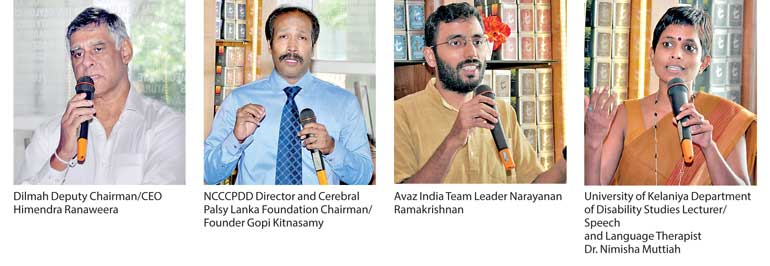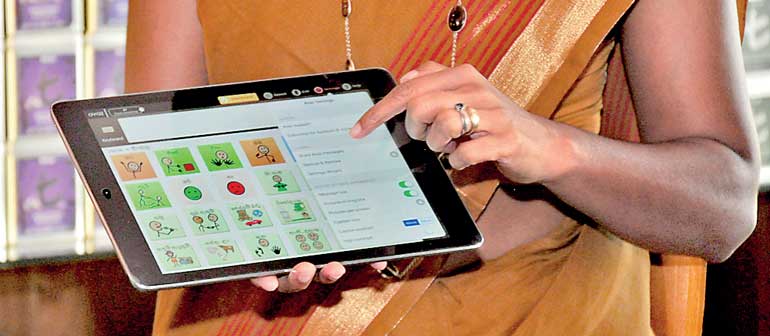Thursday Feb 26, 2026
Thursday Feb 26, 2026
Wednesday, 22 November 2017 00:00 - - {{hitsCtrl.values.hits}}

 By Fathima Riznaz Hafi
By Fathima Riznaz Hafi
Avaz Sri Lanka, the first Augmentative and Alternative Communication (AAC) app in the Sinhala language has been launched, bringing new hope to Sri Lankan children with speech and communication difficulties.
AAC assists or replaces speech for children with Autism, Cerebral Palsy, Down’s Syndrome and other developmental disorders as they find it difficult to communicate, either due to speech difficulties or other factors. This app serves as an alternative device that facilitates communication for these children.
The picture and text based communication system converts pictures to speech. It contains pre-recorded words and phrases, allowing many more to be added to suit the user’s needs.
Using this app, children can select pictures that then voice out the word, thus enabling the children to express themselves.
Prior to introduction of the app, paper-based versions were used; and these come with limitations – words and pictures from which the children can choose are less; also, paper is subject to wear and tear. English speaking children however had the benefit of using apps because the English version has been available for a while.
With the app, choices are in abundance – in addition to the numerous words and pictures that are already available in the system, the users can add many more as the app is customisable to suit the needs of the individual child.
This system is already being utilised internationally in English as well as some other languages and though Sri Lankan children too have been using the English app, children who mainly communicate in Sinhala have been left behind. Avaz Sri Lanka’s availability in Sinhala now enables Sri Lankan Sinhala speaking children to enjoy the same benefits.
Avaz Sri Lanka was made possible by three organisations that collaborated to assist children with special needs and their families to overcome their difficulties: Invention Labs (the creators of the Avaz app), National Centre for Cerebral Palsy and other Development Disorders (NCCCPDD), and the Merrill J. Fernando Charitable Foundation (philanthropic arm of Dilmah Tea).
Speaking at the launch of Avaz Sri Lanka on Thursday (16), NCCCPDD Director and Cerebral Palsy Lanka Foundation Chairman/Founder Gopi Kitnasamy said, “‘Avaz’ in Hindi means ‘voice’; this is not just an app; we are giving a voice to a child or adult who cannot communicate and cannot express their feelings. This app enables the child to express himself. We are bringing it to Sri Lanka with a local, cultural incorporation and we can customise this for each individual; for example, I can take a photo of ‘kotthu’ and add it to the system and then if my son wants kotthu for dinner, he can touch that picture. We can add the vocabulary that is used regularly and modify it for individual use.”
Kitnasamy’s son has Cerebral Palsy and this had prompted him to establish the Cerebral Palsy Lanka Foundation (CPLF) and he has since been striving to help other children who are going through similar challenges.
“We have been looking for an AAC for several years because my son finds it difficult to communicate – he is non-verbal and can’t write because he cannot hold a pen. He is very intelligent and can understand things very well, but as a parent it was very frustrating seeing him struggle to express himself. We looked for solutions, we tried to come up with different ways, we used picture boards, we gave him choices – ‘do you want this or this’, but we were restricting him by giving ‘our’ choice for him to choose from – he was not giving ‘his’ choice; then we tried AAC and there was tremendous improvement; Nimisha suggested we bring Avaz to Sri Lanka.”
University of Kelaniya Department of Disability Studies Lecturer/Speech and Language Therapist Dr. Nimisha Muttiah noted, “There is a huge gap with kids who are unable to talk and communicate – we have wheelchairs for children who can’t walk, other devices for children who can’t see, and hearing aids for children who can’t hear – but for children who cannot speak, we have nothing here. This is something really important that we needed to do and I give credit to my students at the university who spent a lot of time and effort programming this app to make it appropriate for our Sri Lankan users. Every child who is unable to communicate now has the chance to do so.”
After presenting a demo in which Dr. Muttiah was conducting a session with one of her patients, she explained, “Before we used Avaz with him, this boy would only communicate with vocalisation sounds, unable to say words, and do a few gestures with his hand; it was very limited; but now with Avaz he is able to answer questions, tell me a little about his family, make comments, say he loves his family, etc. – there are so many advantages here.”
Avaz is an assistive technology development company based in Chennai. A product of Invention Labs, which was founded in 2008, by Indian Institute of Technology students, it has been designed after many years of feedback from speech therapists, parents and school children in India and USA and has evolved into a highly-rated AAC system used by leading special education schools.
Avaz India Team Leader Narayanan Ramakrishnan says, “We build technology products for children with speech difficulty and create a communication app which is localised and customised for a particular culture. Since our journey that started around eight years back, we have schools around the world using Avaz, and now we are launching it in Sri Lanka. We have come a long way and there is still a long way to go where every child’s voice needs to be heard.
“Avaz is a tool at the end of the day and we really would like every child to be able to express himself. Usually when we collaborate with countries it takes a lot of time to happen but thanks to the cooperation of Nimisha and Gopi we were able to do this faster and we are excited that now Sri Lankan kids will have access to a communication app for them to participate in classrooms and be social.”
Giving a visual overview of the app, Ramakrishnan pointed out the set of pictures that have voices. “The child can tap them to make words and sentences. He can select ‘roti’, ‘kadala’ and ‘kotthu’ and the parents can add more voices and pictures as they go along. This can be customised to match the child’s level – if the child has difficulty figuring things out with many pictures, the parents can hide a lot of the pictures and make the picture sizes bigger; if the child has involuntary motor control they can accordingly choose the settings so that it is customised for that.”
This app is not only beneficial for children but also adults such as stroke patients, who have speech difficulties. Following the launch of the Sinhala app, the Tamil version will also be launched shortly. Avaz Sri Lanka can be downloaded free from the App Store: www.bit.ly/avazsrilanka.
At present it is only available on the App Store for iOS devices but efforts are underway to make it available on Android soon. Further information about the app can be obtained from: www.avazapp.com, www.cplanka.org or www.mjffoundation.org.
Pix by Lasantha Kumara